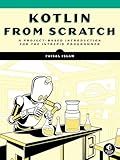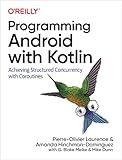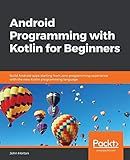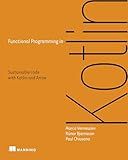Best Kotlin Books to Buy in March 2026

Kotlin in Action, Second Edition



Kotlin from Scratch: A Project-Based Introduction for the Intrepid Programmer



How to Build Android Applications with Kotlin: A hands-on guide to developing, testing, and publishing production-grade Android 16 apps



Head First Kotlin: A Brain-Friendly Guide



Kotlin in Action



Programming Android with Kotlin: Achieving Structured Concurrency with Coroutines



Android Programming with Kotlin for Beginners: Build Android apps starting from zero programming experience with the new Kotlin programming language



Functional Programming in Kotlin


The await() function in Kotlin is used in conjunction with coroutines and has two main purposes: suspending the current coroutine until the result is available and returning the result itself.
When await() is called on a deferred object, it suspends the execution of the coroutine in which it is called. This means that other coroutines can continue running while the current one waits for a result. It allows for asynchronous programming by not blocking the thread and instead allowing it to be used for other tasks.
Once the result is available, await() resumes the coroutine and returns the result. The returned value depends on the type of the deferred object. For example, if the deferred object's type is Deferred<T>, await() will return a value of type T.
It is important to note that calling await() on a deferred object should always be performed from within a coroutine or a suspending function. If it is called from a regular function, it will result in a compilation error, as non-suspending functions cannot be suspended.
How to deal with exceptions when using await() in Kotlin?
In Kotlin, you can deal with exceptions when using await() by handling them using try and catch blocks. Here's an example of how you can do it:
- Wrap the code where you are using await() inside a try block.
- In the catch block, you can handle the exception by either logging an error message, throwing a custom exception, or returning a default value.
Here's a code snippet demonstrating this approach:
try { val result = someAsyncTask.await() // Placeholder, replace with your own async task
// Continue with the code after the awaited task
} catch (e: Exception) { // Handle the exception here Log.e(TAG, "An exception occurred: ${e.message}")
// or throw a custom exception
throw CustomException("An exception occurred while waiting for the async task to complete")
// or return a default value
return defaultValue
}
By using this approach, you can handle exceptions that may occur during the execution of the code in the await() method.
What happens if multiple coroutines await the same deferred object in Kotlin?
When multiple coroutines await the same Deferred object in Kotlin, they will be suspended until the Deferred object is completed. Each coroutine will resume its execution with the resulting value or exception from the Deferred object.
Here's an example to illustrate this:
import kotlinx.coroutines.*
suspend fun fetchData(): Int { delay(1000) return 42 }
fun main() = runBlocking { val deferredValue = async { fetchData() }
launch {
val result = deferredValue.await()
println("Coroutine 1: $result")
}
launch {
val result = deferredValue.await()
println("Coroutine 2: $result")
}
}
In this example, two coroutines are launched, both of which await the same Deferred object deferredValue. The fetchData() function is a suspend function that returns 42 after a delay of 1 second.
Both coroutines will be suspended at the deferredValue.await() expression until the fetchData() function completes. Once the fetchData() function completes, both coroutines will be resumed and print their respective results:
Coroutine 1: 42 Coroutine 2: 42
This demonstrates that multiple coroutines can safely await the same Deferred object, and when it completes, they will resume execution with the same result.
How to wrap await() in a try-catch block in Kotlin?
In Kotlin, you can wrap await() in a try-catch block like this:
import kotlinx.coroutines.* import java.lang.Exception
fun main() { // Create a coroutine scope runBlocking { try { // Launch a coroutine val result = async { fetchData() }
// Wait for the result
val data = result.await()
println("Data: $data")
} catch (e: Exception) {
println("Exception occurred: ${e.message}")
}
}
}
suspend fun fetchData(): String { delay(1000) // Simulate some async operation return "Data" }
Explanation:
- First, import the necessary classes for coroutines and the Exception class.
- Inside the main function, create a coroutine scope using runBlocking.
- Wrap the coroutine code inside a try-catch block.
- Launch a coroutine using async and assign it to a variable result.
- Use await() on result to wait for the result. This suspends the coroutine until the result is available.
- Handle the successful result by printing it.
- In the catch block, handle any exceptions that may occur during the execution of the coroutine. Print the exception message for demonstration purposes.
In this example, if an exception occurs within the coroutine, it will be caught by the try-catch block and the exception message will be printed.
How to chain multiple await() calls in Kotlin?
In Kotlin, you can chain multiple await() calls using coroutines. Here's an example:
- Ensure you have the necessary dependencies. To use coroutines, you need to include the kotlinx-coroutines-core library in your project. You can add it to your build.gradle file:
dependencies { implementation "org.jetbrains.kotlinx:kotlinx-coroutines-core:$coroutinesVersion" }
- Create an async block for each asynchronous operation you want to perform. Each async block returns a Deferred object, which represents the result of a computation that may not have completed yet.
import kotlinx.coroutines.async import kotlinx.coroutines.delay import kotlinx.coroutines.runBlocking
fun getUserData(): String { // Simulate an asynchronous operation delay(1000) return "User Data" }
fun getAuthToken(): String { // Simulate another asynchronous operation delay(2000) return "Auth Token" }
fun main() = runBlocking { // Chain multiple await() calls using async blocks val result = async { val userData = async { getUserData() } val authToken = async { getAuthToken() }
"User data: ${userData.await()}, Auth token: ${authToken.await()}"
}
// Print the result
println(result.await())
}
In the example above, getUserData() and getAuthToken() simulate async operations using the delay() function. The values are obtained using the await() function, which waits until the deferred computation has completed.
The main() function is wrapped in runBlocking to create a coroutine context. The async blocks are launched within this context. Finally, the result.await() statement waits for the result of the entire computation and prints it.
How to implement await() with CompletableFuture in Kotlin?
In Kotlin, you can use the CompletableFuture.get() method to implement await() with CompletableFuture.
Here is an example:
import java.util.concurrent.CompletableFuture
fun main() { val future = CompletableFuture()
// Simulating a background task
Thread.sleep(2000)
future.complete("Task Completed")
// Wait for the result using await()
val result = future.get()
println(result)
}
In the above example, a CompletableFuture is created without any initial value. Then, a background task is simulated using Thread.sleep() for 2 seconds. After that, the future.complete() method is called to complete the future with a value.
Finally, future.get() is called to wait for the result. This method blocks until the future is completed and returns the result.
The result is then printed to the console.
Note: The future.get() method can throw InterruptedException and ExecutionException, so you might want to handle those exceptions appropriately, depending on your use case.
